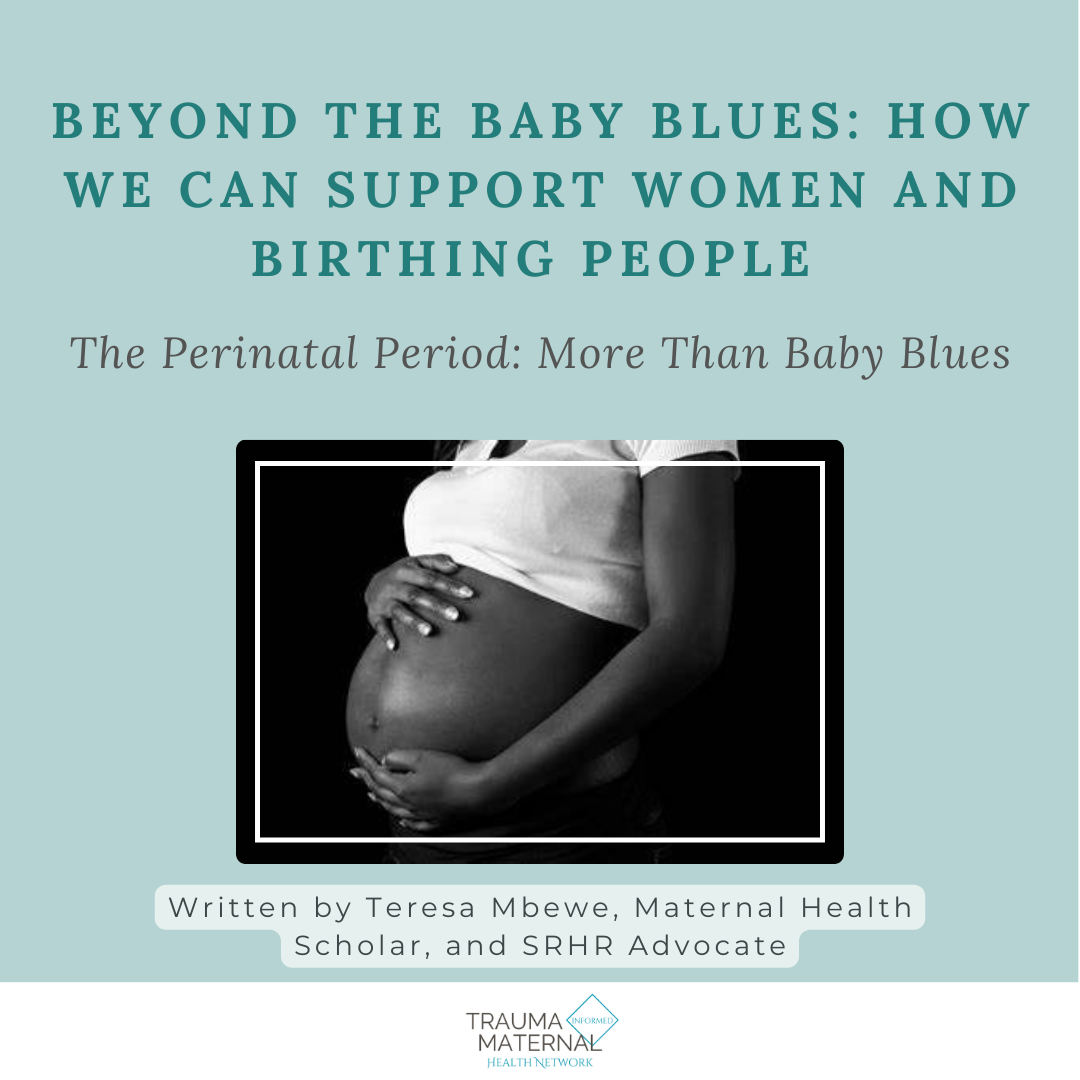Shifting the Medical Culture: A Trauma-Informed Approach to Maternal and Emergency Care
Written by Guest Blogger Ashley Wright, PA-C
Ashley Wright, PA-C is one of Maternal Trauma Support, LLC’s exceptional advisory board members with a vision of how to improve patient care across the medical landscape. We interviewed Ashley about how she shows up to her role as a trauma-informed Physician Assistant (PA), and some common patient care pitfalls for providers in this setting. Check it out!
Q: As a Physician Assistant, what does Trauma-Informed Care (TIC) mean to you?
A: Trauma-informed care means that a provider is well-informed that the conversation they are about to have; the recommendations they are about to make; and/or the tests they plan to order - may all be difficult for a patient to process.
It is also important for providers to look for body signals or cues in the facial expressions of the patient. This is because a patient with a prior traumatic experience may feel afraid or uncomfortable to speak up.
Information is power in these situations.
Q: How do you personally prioritize this approach to care in your role? Can you give an example?
A: As a Certified Physician Assistant, I primarily work in the Emergency Room. When I’m working clinically in the ER, I mostly see patients and their families on the scariest day of their lives. What may seem like ‘just another chest pain’ to me could be the scariest day of a patient or spouse’s life when I start to talk about hospitalization and reasons for the recommendation.
It is extremely important to lead with compassion, to provide space to validate fears, and answer questions the patient or family may have. Keeping in mind that a patient has autonomy over their decision, I hope that the education I have provided, as well as the trusting relationship we have established, will help the patient accept the team’s medical recommendations, based on having their best interest in mind.
Q: In your opinion, what is one of the most common pitfalls or examples you see providers around you or in your field struggling with (or being limited on) when it comes to embodying trauma-informed care for their patients?
A: Unfortunately, medical providers (i.e., MDs, PAs, NPs, CNRAs, RNs, etc.) often just want to ‘get the job done.’ They may quickly rush through education and go straight towards a recommendation and/or solution. This happens far too often in women’s health care. Even I am guilty of that at times, especially on very long and stressful days. However, I am working to recognize when this is happening so I can shift back to slowing down, offering space, and making more room for questions.
It is common for me to encounter situations where, due to a patient’s past traumatic ED and/or hospital experience, they (understandably) may feel unsupported by medical staff or hesitant to follow through on our recommendations..
For example, I had a patient in my ED who I was recommending to stay in the hospital for continued monitoring. I could tell she was extremely hesitant. I listened a little closer and learned that she had a prior history of breast cancer and received harmful care that altered her perception and trust of medical professionals. When she received a phone call regarding her biopsy results, this left her very distraught. She deserved an in-person conversation rather than an impersonal phone call.
On a personal note, I felt extremely blindsided and traumatized when the OBGYN on call gave us the news, ‘you’ll need another c-section’ like it was no big deal. After my failed VBAC and prior Birth PTSD, I barely recovered from my first daughter’s birth. I even had insensitive traumatic comments made to me during therapy! A place that was supposed to be a ‘safe’ place.
It happens all around us.
Q: What are the first steps that providers can take to be more trauma-informed and collaborative?
If providers simply slowed down and gave patients time to process difficult news, it would create more of an opportunity for the provider to pick up on nonverbal cues that the patient is struggling to process information or recommendations.
Words have meaning and it is more important than ever to try to do better as healthcare providers.
Q: From where you are standing, what does your field need for Trauma-Informed Care to become more of a priority?
A: The conversation needs to just start.
We need to bring awareness to our providers, to the hospitals, and to patients! Because when you speak up and share your story, it has impact and meaning.
For patients with a trauma history, if you feel ready to share parts of your story with a provider, it may remind your provider to acknowledge what you’ve been through and can move the needle even a little bit.
Q: Is there anything else on this topic you would like to share for our readers?
A: I am working hard to change the narrative on maternal health and trauma. The reality is, if you read or hear about ‘patient trauma’ or maternal trauma’ and you ‘roll your eyes’ thinking it is not a big deal, that means that you are lucky enough to not have experienced an actual or perceived threat of injury/death to yourself or unborn child, or fear a similar experience happening again.
Please be mindful and listen even if you feel like someone’s story does not apply to you. Pregnancy, infertility, miscarriages, death, and birth can all be traumatic, regardless of the outcome. These are mind and body-changing experiences to a birthing person and the people in their direct circle, and we need to be mindful of it.
If we want to create a culture that supports families and those affected by maternal trauma, we need to acknowledge it is a common and real experience that is minimized in our society. And it can have lasting effects on the child, family, support system and specifically the future health of the patient if not treated with compassion, care, and a trauma-informed lens.
It is refreshing to know that providers like Ashley exist.
She has used her professional and personal experiences to create a culture of safety, transparency, collaboration, and care to every patient she encounters. It brings us hope that more medical providers will seek to become trauma-informed, leading to less (re)traumatization for patients, and more positive outcomes in maternal health settings.
- - - - -
Guest Author: Ashley Wright, PA-C
Ashley completed her Bachelor's Degree at the University of Arizona where she fell in love with medicine and graduated Physician Assistant school from Northern Arizona University as Class President. Upon completion of graduate school, she moved to Florida and worked in Orthopedic Trauma/Joint and Spine Surgery for several years and then wanted to expand her work as a PA. She completed an Emergency Medicine Fellowship for PA and NPs with the Mayo Clinic School of Medicine in Minnesota. She has been working in Emergency Medicine in Florida ever since and has also worked in PA education.
Over the course of almost 10 years in medicine, she has held the hand of several women suffering severe loss & pain during pregnancy and postpartum. It was only until she became a mother herself to two beautiful little girls that she truly learned the trauma and injustice that women experience as patients in our healthcare system. Her own birth trauma and story has led her to pledge her life to advocating and hoping to change policy for a better world for mothers and women to live in.
About the Trauma-Informed Maternal Health Network
Liz Gray, LCSW and Olivia Verhulst, LMHC, PMH-C are the co-founders of the Trauma-Informed Maternal Health Directory. They are clinical psychotherapists with a deep passion for increasing accessibility of trauma-informed care to the maternal health population. They created this specialized directory to connect women experiencing infertility, pregnancy, postpartum, and new parenthood to trauma-informed health and mental health providers.
Interested in writing a guest blog post?
If you are a trauma-informed provider who works with the perinatal population, submit a blog proposal HERE!
Please make sure the article is original content that aligns with our values of safety, inclusion, transparency, collaboration, empowerment, and support.




